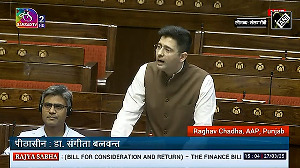Why did the banks take such a large exposure to Kingfisher? Did a few politicians and ministers influence the banks in giving loans to Kingfisher, asks Tamal Bandyopadhyay.

In late July, the Reserve Bank of India (RBI) penalised 11 banks for not complying with the norms to classify an account as fraud and report to the regulator.
Despite being advised by the RBI to report fraud in an account “immediately” after the Central Bureau of Investigation (CBI) initiated criminal proceedings, the banks had either delayed or did not report the fraud to the central bank.
The RBI did not mention it but the “account” in question is that of the now-defunct Kingisher Airlines Ltd.
Before imposing the penalty on July 31, the RBI had met representatives of these banks.
This followed show cause notices that were issued, asking them why penalty should not be imposed for non-compliance with the directions related to bank frauds.
Collectively, these banks have been fined Rs 8.5 crore.
The Oriental Bank of Commerce has been penalised the maximum -- Rs 1.5 crore; Rs 1 crore penalty has been imposed on Indian Overseas Bank, Punjab & Sind Bank, UCO Bank and United Bank of India; State Bank of India (SBI), Punjab National Bank, Bank of Baroda, Corporation Bank, Federal Bank, Jammu & Kashmir Bank have been penalised Rs 50 lakh each.
“This action is based on the deficiencies in regulatory compliance and is not intended to pronounce upon the validity of any transaction or agreement entered into by the banks with their customers,” an RBI release said.
The amount of penalty is peanuts but the banks being penalised run reputation risks.
What exactly happened? Why did they delay in taking action?
It’s an interesting story which involves the finance ministry (representing the majority owner of these banks), the CBI, the regulator and the banks themselves.
First, let’s recap the Kingfisher Airlines nightmare for the Indian banking system.
In March 2016, UB group chairman Vijay Mallya, whose grounded airline had not returned some Rs 9,100 crore to a consortium of banks led by the SBI, left for the UK.
Since its inception in 2005, Kingfisher had never posted profit.
Its losses zoomed after it acquired low-cost airline Deccan Aviation Ltd in 2007.
Between fiscal 2008-09 and September 2012 -- when it was grounded -- its accumulated losses reached Rs 8,015.8 crore.
By March 31, 2013, the losses doubled to Rs 16,023.46 crore, making its net worth a negative Rs 12,919.82 crore.
Why did the banks take such a large exposure to Kingfisher?
Mallya, a member of the Rajya Sabha, the Upper House of India’s Parliament, knew well how to convince the bankers.
Many say he was supported by some of the politicians and ministers of those days.
At its peak, Kingfisher was flying 66 planes to 68 locations, including eight international destinations, with 374 flights a day, enjoying one-fifth market share.
Under an RBI approved scheme, and based on the assessment of SBI Caps, the merchant banking wing of India’s largest lender, the Kingfisher debt was first restructured in November 2010 when the bankers’ consortium converted Rs 1,355 crore of debt into equity, at a 61.6 per cent premium to the market price of the airline's stock price.
Following this, the banks owned 23.21 per cent of its equity.
The promoter, too, converted Rs 648 crore of debt into equity.
Apart from this, the bankers also stretched the period of repayment of loans to nine years with a two-year moratorium, cut the interest rates and sanctioned a fresh loan.
But by end-2012, it was curtains for Kingfisher Airlines.
Rating agency Crisil Ltd downgraded its credit rating to its lowest 'D' grade, denoting default.
Even in 2008, the ratio of its long-term debt to equity capital was 3.54 times against the industry average of 2.06 times.
While doing the restructuring, the banks took a couple of Mallya’s properties in Mumbai and Goa, helicopters and shares of group companies United Spirits Ltd and Mangalore Chemicals and Fertilizers Ltd as collaterals as well as first charge on fixed assets such as coaches that ferry passengers to the tarmac and tractors, besides a corporate guarantee from United Breweries (Holdings) Ltd, the group holding company, and the Kingfisher brand.
Audit firm Grant Thornton India valued the properties at Rs 3,000 crore.
The sale of properties and shares generated some money for the banks, but too little to cover their entire exposure.
The CBI first initiated the so-called preliminary enquiry against the airline and IDBI Bank in August 2014 and later, in January 2017, filed the first information report for irregularities in sanctions and disbursements of short-term loans given to the company.
It also found that a significant portion of the money raised from IDBI Bank was either diverted to other group companies or parked overseas.
Against this backdrop, in January 2016, the department of financial services in the ministry of finance stepped in.
It wrote to those banks which had exposure to Kingfisher Airlines, asking them to scrutinise the account in details and prepare a note for their audit committees.
While doing this, the banks must check whether there was any deviation from their credit policy for giving loans to Kingfisher Airlines, if steps were taken to monitor the end-use of the funds, and if any deviation/irregularities were found after the fund was disbursed.
Finally, the banks were told that “directions of the audit committee may be sought on whether to declare the account as fraud”.
Essentially, the banks did not need to rush to declare the account fraudulent, following the CBI action.
There are more twists and turns in this story.
Since the preliminary forensic audit was a bit sketchy and vague based on which the joint lenders’ forum could not take a call on the status of the exposure, business consulting firm EY was asked to do a detailed forensic audit, the cost for which was Rs 2.5 crore.
However, the banks could not access this report and place it to their audit committees.
The consortium leader, SBI, did not share the report with other banks as the CBI had reservations about this.
I am sure these critical aspects of the case were discussed by the bankers at their meeting with the RBI.
The penalty does not draw the curtains on the Kingfisher case.
It is still shrouded in mystery and too many questions remain unanswered.
Why did the finance ministry (and not the RBI) direct banks to take the matter to their audit committees?
Why did the CBI get in the way of the banks’ access to the detailed forensic report?
Did a few politicians and ministers influence the banks in giving loans to Kingfisher?
Or, probably the forensic report had no incriminating evidence.
Tamal Bandyopadhyay, a consulting editor of Business Standard, is an author and senior adviser to Jana Small Finance Bank Ltd.
Photograph: PTI Photo













 © 2025
© 2025